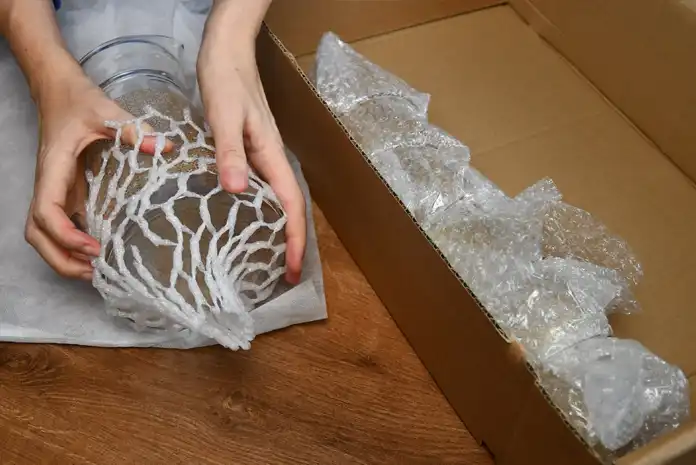Whether it’s your great-grandma’s crystal china, glassware from your wedding day, or any other fragile sentimental family heirloom, these items need to be treated with special care and handling when packing and storing them. They’re easily damaged and, without the necessary precautions, might be crushed by heavy items or packed without enough protection for long-term safety. Although it can seem a little nerve-wracking to store fragile items, using proper care and the right packing materials will protect them for years to come. Here are some of the most important tips for storing fragile items in a storage facility or home.
The Benefits of Packing Fragile Items Correctly
Packing fragile items for moving or storage is important, as doing so can help save you time, money, and a lot of frustration later on. Some of the most notable benefits of following storage tips on how to pack fragile things include:
Prevents Damage — Proper packing minimizes the risk of breakage, ensuring that fragile items remain intact during storage and retrieval.
Reduces Replacement Costs — By preventing damage, you avoid the need for costly repairs or replacements.
Preserve Value — Well-protected items retain value, especially important for valuable or sentimental possessions.
Maintains Organization — Proper packing keeps items organized and easy to locate, reducing the hassle and time spent searching for specific objects.
Enhances Longevity — Correctly stored items are shielded from environmental factors like dust, moisture, and temperature fluctuations, extending their lifespan.
How to Prepare Delicate Items for Self-Storage
To ensure you’re storing fragile items correctly, you must take the time to prepare them well before you start packing. First, thoroughly clean each piece of glassware, fine china, or fragile collectible you intend to store. This step will help prevent damage caused by dirt or debris on the delicate surfaces. Follow specific cleaning instructions for each item, avoiding harsh chemicals on delicate porcelain, clay, or other sensitive materials. After cleaning, set aside your fragile items to dry completely.
Once dried, take the time to inspect each fragile item individually. Check for any signs of damage, such as cracks or chips, and set aside any pieces with imperfections. It’s best to repair these items before you start packing. Minor chips or cracks can worsen in storage, leading to more serious, potentially irreparable damage later. After cleaning delicate items, letting them dry, and checking for repairs, you can begin the packing process.
Choosing the Right Packing Material to Prepare Fragile Items for Storage
After finishing the preparation process, it’s time to wrap each item with the appropriate packing supplies. Items like china and glassware need to be thoroughly cushioned before being put into a storage space to maximize protection. There are several options for wrapping fragile items, including the following:
Bubble wrap
Packing peanuts
Packing paper
Foam sheets
Foam inserts
Stretch wrap
Packing tape
Felt dividers
Sturdy moving boxes
You can use a mixture of any of the above; it really comes down to personal preference. The key is ensuring that you adequately wrap each item so there are no unprotected areas when putting them into your storage container.
Tips to Store Your Fragile Items and Prevent Damage
Packing your fragile items will take a little extra time and care than packing bulkier items, but the preparation is worth it in the long run. Here are some essential tips to help you store your items safely over time.
Use the Right Storage Solutions
While cardboard moving boxes are suitable for storing fragile items, you should select the appropriate size to fit your belongings. Opt for smaller boxes to prevent overfilling and excessive pressure on the contents. Alternatively, plastic storage bins offer added protection.
Pad the Boxes Before Putting Items Inside
A great tip to keep your items safe is to pad the boxes you’re using for fragile items before packing. You can line them with foam inserts or felt dividers and then put in breakable items that have been individually wrapped. This adds a layer of shock absorption and can help protect items from damage.
Wrap Your Fragile Items in Several Layers
Before putting anything into boxes, wrap each item individually to ensure proper protection. Larger items like mirrors can be wrapped with foam sheets or a moving blanket to prevent damage. For smaller fragile items such as china or glassware, consider using a combination of bubble wrap, packing peanuts, foam inserts, or other materials.
Don’t Overstuff Boxes
To protect your items from getting squished or coming in contact with one another, it’s important to avoid overstuffing boxes. You can put larger items on the bottom of a box, add some packing peanuts or packing paper, and then top it off with smaller, lighter items to help fill the space. However, if a box is reaching its capacity or getting heavy, tape it up and open a new one.
But Fill Empty Spaces
Another key element of packing fragile items is to ensure no empty spaces in the box. Although this may sound contradictory to the previous point, empty spaces could lead to external shock, potentially causing damage. To prepare for storage, use packing paper, foam inserts, or other materials to create a protective layer for your belongings and fill the gaps in the box. Additional Styrofoam or towels can also be utilized during packing if you aim to minimize expenses.
Label Boxes as “Fragile”
When you’re packing items, don’t forget to label the boxes so you can remember they are fragile later! The longer you keep items in your storage unit, the more likely you are to forget what’s inside. To ensure things remain intact the next time you move or access them, attach a “fragile” label to the box or write it in bold, permanent marker.
Keep Fragile Items Off the Ground of Your Storage Unit
Next, you’ll need to carefully organize your storage unit to avoid crushing your fragile items. This is pretty self-explanatory, but you’ll want to stack heavier items on the ground first and keep the fragile boxes for the top. You can add pallets to the floor of your self-storage unit for even more benefits. Still, any bulky items, such as kitchen appliances or antique furniture, will need to be put in before your more delicate belongings.
Or Invest in Shelving
Although strategic stacking can work, it might not be a risk you’re willing to take with sentimental items. Instead of playing Jenga with your glassware and beloved china, consider adding some shelves to your self-storage unit. You can buy industrial shelves that fit small moving boxes on them. Depending on the layout of your unit, you can have these against a wall or in the middle of your unit, with aisles surrounding them for easy access. This extra space lets you navigate your storage unit without having to take everything out. To enjoy this flexibility in movement, we recommend carefully choosing the right size unit.
Choose Climate-Controlled Storage Options
Finally, make sure you find a place to store your fragile items so they’re kept in good condition. For the best results, opt for a climate-controlled storage unit. This will control the temperature and humidity of your storage unit, which will help keep things stable and reduce the risk of damage caused by extreme fluctuations. Although beneficial in all geographic locations, climate control is especially important for hot, humid cities and is worth the investment.
To keep your fragile items safe and protected in secure self-storage facilities, partner with The Lock Up Self Storage today. Our climate-controlled self-storage units are perfect for all your belongings, whether they’re fragile or not. We offer a variety of self-storage units in varying sizes to ensure all of your belongings fit without having to stack everything from floor to ceiling. With flexible leasing options, you can use our self-storage for as long as you need, whether short-term or long-term. Our facilities have top-of-the-line security features like perimeter alarms, gated access codes, and 24/7 CCTV. To learn more about our self-storage units at The Lock Up, call us today at 1-866-327-LOCK or stop by one of our locations for a tour.



















